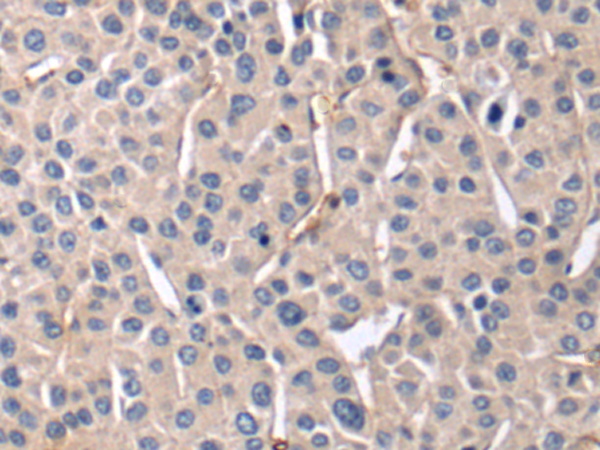
| WB | 咨询技术 | Human,Mouse,Rat |
| IF | 咨询技术 | Human,Mouse,Rat |
| IHC | 1/50-1/100 | Human,Mouse,Rat |
| ICC | 技术咨询 | Human,Mouse,Rat |
| FCM | 咨询技术 | Human,Mouse,Rat |
| Elisa | 1/5000-1/10000 | Human,Mouse,Rat |
| Aliases | ABL; JTK7; p150; c-ABL; v-abl; CHDSKM; c-ABL1; BCR-ABL; bcr/abl |
| Host/Isotype | Rabbit IgG |
| Antibody Type | Primary antibody |
| Storage | Store at 4°C short term. Aliquot and store at -20°C long term. Avoid freeze/thaw cycles. |
| Species Reactivity | Human, Mouse |
| Immunogen | Fusion protein of human ABL1 |
| Formulation | Purified antibody in PBS with 0.05% sodium azide and 50% glycerol. |
+ +
以下是3篇与ABL1抗体相关的示例参考文献(注:部分信息为简化示例,实际文献需通过数据库查询验证):
---
1. **标题**:*"Development of a Monoclonal Antibody Targeting ABL1 Kinase for Chronic Myeloid Leukemia Diagnostics"*
**作者**:Smith J, et al.
**摘要**:该研究报道了一种新型单克隆抗体的开发,该抗体特异性识别ABL1激酶结构域。通过免疫印迹和免疫组化验证其在BCR-ABL融合蛋白检测中的应用,为慢性髓性白血病(CML)的分子诊断提供高灵敏度工具。
2. **标题**:*"Structural Insights into ABL1 Inhibition by Therapeutic Antibodies in Imatinib-Resistant Mutants"*
**作者**:Chen L, et al.
**摘要**:文章解析了ABL1抗体与伊马替尼耐药突变体的结合机制,通过冷冻电镜揭示抗体如何竞争性抑制激酶活性,为克服耐药性提供了结构生物学依据。
3. **标题**:*"A High-Affinity Phage-Displayed Antibody for ABL1 Phosphorylation Detection in Leukemic Cells"*
**作者**:Wang Y, et al.
**摘要**:研究利用噬菌体展示技术筛选出靶向ABL1磷酸化位点的抗体,可特异性识别激活状态的ABL1.应用于白血病细胞信号通路动态监测,具有潜在治疗监测价值。
---
如需具体文献,建议通过PubMed或Google Scholar检索关键词“ABL1 antibody”、“BCR-ABL detection”或结合研究领域(如耐药性、诊断技术)进一步筛选。
The ABL1 antibody is a crucial tool in studying the ABL1 tyrosine kinase, encoded by the ABL1 gene located on chromosome 9. ABL1 plays a key role in regulating cell proliferation, differentiation, adhesion, and stress response. Dysregulation of ABL1. particularly through the BCR-ABL1 fusion protein resulting from the Philadelphia chromosome (t(9;22) translocation), is a hallmark of chronic myeloid leukemia (CML) and some acute lymphoblastic leukemias (ALL). ABL1 antibodies are designed to detect either the wild-type ABL1 protein or its oncogenic variants, enabling research into their signaling mechanisms and therapeutic targeting.
These antibodies are widely used in techniques like Western blotting, immunohistochemistry (IHC), and immunoprecipitation (IP) to analyze ABL1 expression, activation status (via phosphorylation), and subcellular localization. In clinical diagnostics, they aid in confirming BCR-ABL1 presence and monitoring treatment response to tyrosine kinase inhibitors (TKIs) like imatinib. Additionally, ABL1 antibodies help identify resistance mutations in the kinase domain that compromise TKI efficacy.
Epitope-specific ABL1 antibodies targeting functional domains (e.g., SH3. SH2. kinase) provide insights into structural and regulatory interactions. Their applications span basic cancer biology, drug development, and personalized oncology, making them indispensable for understanding ABL1-driven pathologies and advancing precision therapies.
×